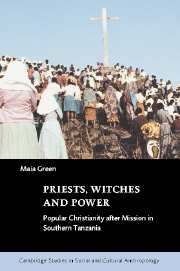Book contents
- Frontmatter
- Contents
- List of maps
- Preface
- 1 Global Christianity and the structure of power
- 2 Colonial conquest and the consolidation of marginality
- 3 Evangelisation in Ulanga
- 4 The persistence of mission
- 5 Popular Christianity
- 6 Kinship and the creation of relationship
- 7 Engendering power
- 8 Women's work
- 9 Witchcraft suppression practices and movements
- 10 Matters of substance
- Notes
- List of references
- Index
- Cambridge Studies in Social and Cultural Anthropology
2 - Colonial conquest and the consolidation of marginality
Published online by Cambridge University Press: 22 September 2009
- Frontmatter
- Contents
- List of maps
- Preface
- 1 Global Christianity and the structure of power
- 2 Colonial conquest and the consolidation of marginality
- 3 Evangelisation in Ulanga
- 4 The persistence of mission
- 5 Popular Christianity
- 6 Kinship and the creation of relationship
- 7 Engendering power
- 8 Women's work
- 9 Witchcraft suppression practices and movements
- 10 Matters of substance
- Notes
- List of references
- Index
- Cambridge Studies in Social and Cultural Anthropology
Summary
Historical geographies
The historical geography of governance in Tanzania fostered the emergence of administrative ethnicities as artefacts of imperial modernity. New relationships between people and places generated by this process were to have implications for the direction of large-scale shifts in religious affiliation in the twentieth century as European missionary orders gained initial rights, and eventual monopolies, in the pursuit of evangelisation strategies in specific areas. The politicised situation of location is manifested in the historical constitution of contemporary cultural identities in Tanzania which continue to be bound up with particular locations, religious affiliations and cultural practices. These processes are clearly evident in the histories of the district of Ulanga and of the Roman Catholic diocese once coterminous with, and now exceeding, its boundaries. In Ulanga, and to an extent outside it, formal affiliation to the Roman Catholic Church is associated with a particular ethnic identity, just as the district, like other ‘out of the way’ (cf. Tsing 1993: 8–49) districts, is associated in national popular culture with a lack of ‘development’ (Green 2000a) and is popularly perceived as being so divorced from contemporary political and economic realities as to be legitimately, if jokingly, more properly considered part of Tanganyika – the pre-independence polity.
The district's majority ethnic group, probably numbering around ninety thousand, are people who define themselves, through adherence to a specific language and body of custom (mila na desturi) as Pogoro.
- Type
- Chapter
- Information
- Priests, Witches and PowerPopular Christianity after Mission in Southern Tanzania, pp. 14 - 33Publisher: Cambridge University PressPrint publication year: 2003



